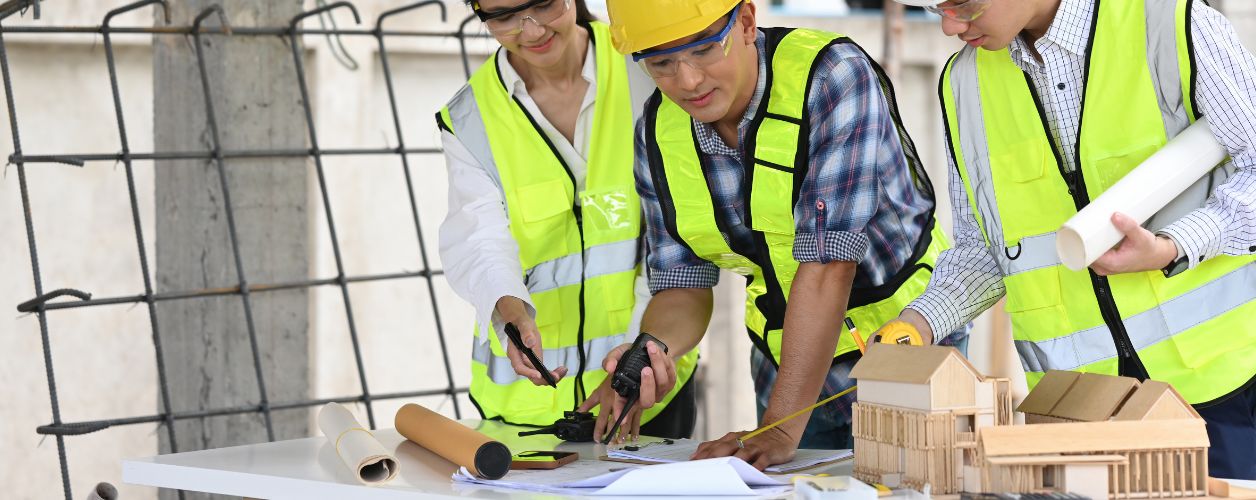Get free quotes within minutes
Top 5 Questions to Ask Before Hiring a Building Contractor

Table Of Contents
- Introduction
- Are you licensed and insured?
- Can You Provide References and Examples of Previous Work?
- What Is the Timeline for Completion?
- What is the payment structure, and how will you manage budget overruns?
- What are your plans for managing subcontractors and ensuring site safety?
- Conclusion
A professional contractor for your construction and renovation work can manage everything. Whether you're building your dream house, you want to just add an extension, or you want to remodel the kitchen, the building contractor will play a critical role. A building contractor will help you in completing the job on schedule. You can discuss your things according to your budget. A professional contractor may make the difference between a positive & a pricey, irritating one.
Although it might be a difficult task to select an appropriate one. Homeowners sometimes face some issues like high fees and hidden charges. Furthermore, there are many alternatives, so when it comes to choosing an appropriate one, it becomes a difficult task. With this post, you can make your decision easily. You can read here the top 5 questions to ask before hiring a building contractor. You can select the suitable one by asking these questions.
1. Are You Licensed and Insured?
You must check the licence and insurance of your contractor before selecting them for your building and construction work. These credentials will ensure a high degree of credibility for your work.
Why is it important?
If you check these factors, then it ensures that the contractor adheres to all applicable legal requirements and industry standards. It indicates that they are qualified to do the job and have completed the relevant training or certification procedures.
Insurance covers both the homeowner and the contractor. With proper coverage, you will not be held liable for any damages or injuries that may occur on the job site. General liability insurance and workers' compensation are two common types of insurance that provide financial protection.
What to look for?
You may request that the contractor provide documentation of a valid licence and active insurance coverage. You should make sure that the insurance covers all workers on the worksite, not just the contractor. Also, you need to verify the license with the local or state licensing body to ensure it is current. This can usually be done online or by contacting the appropriate organisation.
Why should you ask?
- A licensed contractor is more likely to be professional, dependable, and aware of local building standards and regulations, which helps to minimise potential problems in the future.
- Insurance assures that you will not be liable for any losses caused by incidents during the project.
- If a worker is harmed or your property is damaged while you are not insured, you may be held liable.
What may go wrong if not checked
- An unlicensed contractor may lack the requisite skills, expertise, or knowledge of construction codes, resulting in subpar workmanship or even safety issues.
- If the contractor is not insured, this may cause repercussions; you may be held liable for accidents or property damage, and this will leave you financially vulnerable.
- You can protect your house and investments by ensuring that your contractor is licensed and insured.
2. Can You Provide References and Examples of Previous Work?
One of the most efficient ways of choosing the right contractor is to ask about their previous Building and Construction work. This may include references and examples of previous work. A professional contractor should have a portfolio of completed projects and satisfied clients that they can gladly show to future consumers.
Why is it important?
References and a portfolio provide insight into the contractor's talents, workmanship, and the types of projects they have successfully executed. Whether it's a renovation, a new build, or particular maintenance work, references can help you assess the contractor's experience with projects like yours.
You can ask for the records of your local home builders, like before and after images, ratings by previous customers, etc. Positive feedback or testimonials from previous clients offer insight into the contractor's professionalism, communication skills, and ability to meet deadlines.
What to ask for?
Contact information for prior clients, especially those who completed projects comparable to yours. Don't be afraid to contact them to enquire about their experience, the quality of the work, and whether they would suggest a building contractor.
A portfolio of completed projects. This may contain images, internet profiles, or reviews that highlight the contractor's skills. If possible, request detailed examples that reflect your vision or scope of work.
Why should you ask?
It allows you to evaluate quality and craftsmanship, ensuring that the contractor's work meets your expectations. All these factors will build your confidence in the contractor's ability to complete the project on schedule, within budget, and to your satisfaction.
What may go wrong if not checked
- Without references or a portfolio, the contractor may lack a proven track record, making you question their dependability and competence.
- If you hire a contractor with poor craftsmanship or a history of broken promises, it can result in costly errors, delays, and dissatisfaction.
- You can request references and view previous Building and Construction projects, which ensures that you are picking a contractor that is dependable, skilled, and capable of completing your project successfully.
3. What Is the Timeline for Completion?
It is better to create a clear timeline for your Building and Construction work. Without a clear timeline, initiatives can easily become delayed, and this may cause extra frustration and disturbance in your everyday life. It becomes vital for both the client and the home builders as it fulfils the requirements of both.
Why is it important?
A precise timeline helps to avoid delays and ensures that the project remains on track. When the contractor gives you a start and end date, you can prepare ahead of time to ensure that the work does not interfere with other events, such as moving into your new house or holding an event.
A timeline with milestones also helps you to track progress along the way. You can monitor the building contractor by splitting the tasks into parts, and this will prevent the issue before it escalates. Request the project's start and finish dates. Request that the contractor produce a concrete timeline with exact dates for when the work will begin and when it is expected to be completed.
Milestones in the project include framing, roofing, and electrical installation. In this manner, you can monitor the project's development and confirm that everything is going as planned.
Why you should ask
A reputable contractor would establish reasonable timeframes based on their experience and the nature of the project. A precise timeline shows that they are organised and capable of managing their task well.
Timely completion ensures that your project does not take weeks or months longer than intended. This avoids frustration and reduces inconvenience to your house or business.
What may go wrong if not checked
Uncertain timeframes can lead to uncertainty, delays, and incomplete work. Without deadlines, the contractor may not feel compelled to complete the project on time. Setting a clear timeline ensures both parties are on the same page and helps maintain a smooth, efficient project from start to finish.
4. What Is The Payment Structure, And How Will You Manage Budget Overruns?
This is very important to understand the payment system for your construction or renovation projects. Clear and straightforward payment conditions eliminate misunderstandings and guarantee that you and the contractor have similar financial expectations. Before the project begins, it is critical to have a clear payment plan in place that includes all components of the job and accounts for potential budget overruns.
Why is it important?
Financial honesty is essential for a productive working relationship. Without a defined payment system, you risk incurring unexpected expenditures or arguments over what is included in the price.
You can manage your money more successfully if you know the payment schedule. Also, it will allow you to plan ahead of time. Understanding when payments are due allows you to avoid financial burden during the project.
What to ask for?
Request a pricing breakdown and a payment schedule outlining key project milestones.
To avoid hidden fees, clarify what is included in the total price. For example, enquire whether materials, permits, or cleanup are included, or whether they will be invoiced extra.
How will unforeseen expenses be addressed? Discuss how any changes to the initial scope of work (such as unexpected repairs or upgrades) will be priced. Will they be charged on an hourly basis, or will a set price be provided?
Why should you ask?
Asking these questions guarantees that the overall cost is within your budget and that there are no unexpected expenses down the road.
A clear payment system sets expectations for both you and the contractor, especially in the event of unexpected costs or modifications to the project scope. This helps to avoid misunderstandings and payment conflicts.
What may go wrong if not checked
Without a defined payment schedule, you may confront conflicts about what has been paid and what remains to be paid, causing unnecessary friction.
Unexpected budget overruns can put a financial burden on projects and cause delays if finances run out before they can be completed. If you do not plan properly, this could derail your schedule and leave you with incomplete tasks.
You will need to have early communication so that payment terms make the process go more smoothly, and it will help you keep a favourable relationship with your contractor.
5. What Are Your Plans For Managing Subcontractors And Ensuring Site Safety?
The most important key components of any construction or renovation project if how your contractor manages job subcontractors and ensures job site safety. If not managed appropriately, these aspects might result in inefficiencies. safety hazards & delays. Ensuring that your contractor has a clear plan for both can help keep your project on pace and everyone safe.
Why is it important?
A well-managed team of subcontractors guarantees that all components of the project are completed efficiently and to the highest standards. A robust site safety plan protects both the workers and your property. Safety measures help to minimise accidents and injuries, while well-executed site security reduces the danger of theft or damage to your home or materials.
What to ask for?
Request a list of subcontractors involved in the project, including their qualifications and expertise. Check to see if they are licensed, insured, and have completed similar tasks in the past. Request a clear safety strategy for the job site. This should include both worker safety measures (such as protective equipment and proper material handling) and general site security (such as fence, restricted access, or worker supervision after hours).
Why should you ask?
A contractor with a reliable team of subcontractors provides quality and efficiency. When the proper professionals are given the correct duties, work runs smoothly and efficiently.
Proper site safety decreases the likelihood of an accident or injury. Knowing that safety precautions are in place allows you to rest comfortably that the workers are safe and your property is secure. This also helps to avoid potential legal complications if an accident occurs.
What may go wrong if not checked
Hiring unqualified subcontractors might jeopardise the quality of the work, resulting in errors, delays, and increased costs to address problems.
Accidents can occur without a sound safety strategy, resulting in injuries, property damage, and even work stoppages. Poor safety standards may also expose you to legal consequences if an event occurs on your site.
You can help your project succeed by ensuring that subcontractors are competent and that a complete safety strategy is in place.
Conclusion
Choose a contractor by asking the above five questions. If you do the same, you can have a professional contractor for your home. Don't be hesitant to delve deeper, ask for references. If something doesn't feel right, you can continue your search. You should be confident and comfortable with your decision.
YOU MIGHT ALSO BE INTERESTED IN

Top 5 Questions to Ask Before Hiring a Building Contractor

Walk-In Shower vs Bathtub: Which Should You Choose?
Capital Cities
- Construction Services Services in Montgomery
- Construction Services Services in Juneau
- Construction Services Services in Pago Pago
- Construction Services Services in Phoenix
- Construction Services Services in Little Rock
- Construction Services Services in Washington, D.C.
- Construction Services Services in Washington, D.C.
- Construction Services Services in Washington, D.C.
- Construction Services Services in Sacramento
- Construction Services Services in Denver
- Construction Services Services in Hartford
- Construction Services Services in Dover
- Construction Services Services in Washington, D.C.
- Construction Services Services in Palikir
- Construction Services Services in Tallahassee
- Construction Services Services in Atlanta
- Construction Services Services in Hagåtña
- Construction Services Services in Honolulu
- Construction Services Services in Boise
- Construction Services Services in Springfield
- Construction Services Services in Indianapolis
- Construction Services Services in Des Moines
- Construction Services Services in Topeka
- Construction Services Services in Frankfort
- Construction Services Services in Baton Rouge
- Construction Services Services in Augusta
- Construction Services Services in Majuro
- Construction Services Services in Annapolis
- Construction Services Services in Boston
- Construction Services Services in Lansing
- Construction Services Services in Saint Paul
- Construction Services Services in Jackson
- Construction Services Services in Jefferson City
- Construction Services Services in Helena
- Construction Services Services in Lincoln
- Construction Services Services in Carson City
- Construction Services Services in Concord
- Construction Services Services in Trenton
- Construction Services Services in Santa Fe
- Construction Services Services in Albany
- Construction Services Services in Raleigh
- Construction Services Services in Bismarck
- Construction Services Services in Saipan
- Construction Services Services in Columbus
- Construction Services Services in Oklahoma City
- Construction Services Services in Salem
- Construction Services Services in Ngerulmud
- Construction Services Services in Harrisburg
- Construction Services Services in San Juan
- Construction Services Services in Providence
- Construction Services Services in Columbia
- Construction Services Services in Pierre
- Construction Services Services in Nashville
- Construction Services Services in Austin
- Construction Services Services in Salt Lake City
- Construction Services Services in Montpelier
- Construction Services Services in Charlotte Amalie
- Construction Services Services in Richmond
- Construction Services Services in Olympia
- Construction Services Services in Charleston
- Construction Services Services in Madison
- Construction Services Services in Cheyenne
Construction Services Related Categories
- Architects
- Barn Repair
- Barndominium Builders
- Bathroom Remodeling
- Bathroom Repair Services
- Builders
- Demolition Services
- Earthquake Retrofitting
- Farmhouse Builders
- Fireplace Builders
- Garage Builders
- Home Renovations
- Kitchen Designers
- Kitchen Remodeling
- Pole Barn Builders
- Shed Builders
- Structural Engineers
- Woodworking






